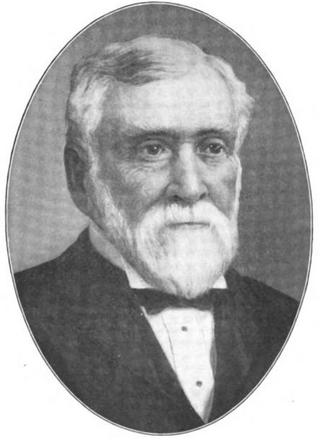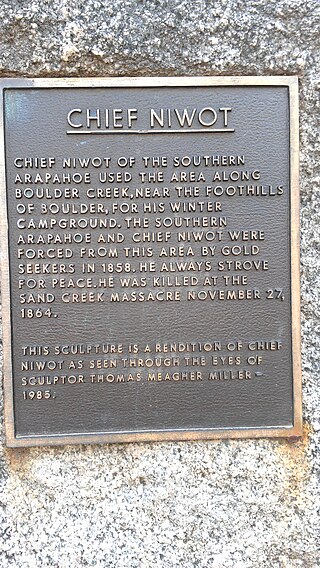Related Research Articles

The Sand Creek massacre was a massacre of Cheyenne and Arapaho people by the U.S. Army in the American Indian Wars that occurred on November 29, 1864, when a 675-man force of the Third Colorado Cavalry under the command of U.S. Volunteers Colonel John Chivington attacked and destroyed a village of Cheyenne and Arapaho people in southeastern Colorado Territory, killing and mutilating an estimated 70 to over 600 Native American people. Chivington claimed 500 to 600 warriors were killed. However, most sources estimate around 150 people were killed, about two-thirds of whom were women and children. The location has been designated the Sand Creek Massacre National Historic Site and is administered by the National Park Service. The massacre is considered part of a series of events known as the Colorado Wars.

John Milton Chivington was a Methodist pastor and Mason who served as a colonel in the United States Volunteers during the New Mexico Campaign of the American Civil War. He led a rear action against a Confederate supply train in the Battle of Glorieta Pass that had the effect of ending the Confederacy's campaigns in the Western states, and was then appointed a colonel of cavalry during the Colorado War.

Silas Stillman Soule was an American abolitionist, military officer and 'conductor' on the Underground Railroad. As a Kansas Jayhawker, he supported and was a proponent of John Brown's movement in the time of strife leading up to the American Civil War.

John Evans was an American politician, physician, founder of various hospitals and medical associations, railroad promoter, second governor of the Territory of Colorado, and namesake of Evanston, Illinois; Evans, Colorado; and formerly Mount Evans, Colorado.

David Hopkinson Nichols was the eighth Lieutenant Governor of Colorado, United States, serving from 1893 to 1895 under Davis Hanson Waite.

Orsamus R. Cole was an American lawyer and judge. He served as the 6th Chief Justice of the Wisconsin Supreme Court, and, until 2013, was the longest-serving justice in the Court's history, with nearly 37 years on the high court. He also represented Wisconsin's 2nd congressional district in the U.S. House of Representatives for the 31st Congress (1849–1850). His name is frequently misspelled as Orasmus.

Edward Wanshear Wynkoop was a US Army officer during the American Civil War and later an Indian agent. He was a founder of the city of Denver, Colorado. Wynkoop Street in Denver is named after him.

Chief Niwot or Left Hand(-ed) was a Southern Arapaho chief, diplomat, and interpreter who negotiated for peace between white settlers and the Cheyenne and Arapaho tribes during the Pike's Peak Gold Rush and Colorado War.
Otis West Norton was an American businessman, politician, and Wisconsin pioneer. He served in the first three sessions of the Wisconsin State Senate, representing Rock County.
Charles Henry Larkin Sr., was an American merchant, real estate developer, and Wisconsin pioneer. He was a member of the Wisconsin State Senate (1866–1870) and State Assembly, representing southern Milwaukee County, and was sheriff of Milwaukee County in 1861 and 1862.
Charles H. Parker was an American cutler, manufacturer, politician, and Wisconsin pioneer. He was the 5th and 21st mayor of Beloit, Wisconsin, serving from 1861 to 1862 and from 1884 to 1887. He also represented Beloit for three terms in the Wisconsin State Assembly. For most of his political career he was a Republican, but he was a Greenbacker for his 1878 legislative term.
Timothy Hopkins Fellows was an American farmer from Bloomfield, Wisconsin who served on the board of supervisors of Bloomfield and also served two one-year terms (1852–1853) as a Free Soil Party member of the Wisconsin State Assembly from Walworth County.
George F. A. Atherton was an American politician from Emerald Grove, Wisconsin, who served in the Wisconsin State Assembly after being elected to the 1st Wisconsin Legislature in 1848. He represented the Rock County towns of Bradford and Janesville.

Philo Atwood Orton, Jr., was an American lawyer, politician, judge, and banker. He was a member of the Wisconsin State Assembly and held several local and county offices in Lafayette County, Wisconsin.
Robert T. Carey was an American from Clinton, Wisconsin who served as a Whig member of the 1st Wisconsin Legislature and as a member of the Wisconsin State Assembly from the district of Rock County consisting of the towns of Beloit, Clinton and Turtle.
Austin Kellogg (1814-1895) was a farmer in Concord, Wisconsin, who served three terms as a member of the Wisconsin State Assembly from Jefferson County.
Paul Crandall was a farmer from Lima, Wisconsin, who spent a single one-year term as a Whig member of the Wisconsin State Assembly from the district of Rock County consisting of the towns of Beloit, Clinton and Turtle, during the 1849 session. He succeeded fellow Whig Robert T. Carey, and would be succeeded in 1850 by another Whig, John A. Segar.
Chauncey Moss Phelps was an American farmer and politician who held office in two counties, as well as in the legislatures of the Territory and State of Wisconsin.
William Shew was a farmer and businessman from Oak Creek, Wisconsin and Cordova, Illinois who served multiple terms in the Wisconsin Territory House of Representatives representing Milwaukee County, and was Speaker of the House of that body during the first (1847) session of the 5th Wisconsin Territorial Assembly, as well as holding various local government posts.
John Reading Briggs Jr., was an American newspaper publisher, politician, and pioneer of Wisconsin and Iowa. He served in the Wisconsin State Senate and Assembly, representing Rock County. He was described as a personal friend of Abraham Lincoln, and was employed as stationery clerk for the United States House of Representatives for the last decade of his life. His wife was Emily Briggs, a pioneering female journalist in Washington, D.C.
References
- ↑ "Members of the Wisconsin Legislature 1848–1999 State of Wisconsin Legislative Bureau. Information Bulletin 99-1, September 1999. p. 39 Archived 2006-12-09 at the Wayback Machine
- ↑ Sand Creek Massacre
- ↑ The History of Rock County, Wisconsin: Its Early Settlement, Growth, Development, Resources, Etc. Chicago: Western Historical Company, 1879; pp. 615, 803
- ↑ History of Rock County etc. p. 503
- ↑ History of Rock County etc. p. 444)
- ↑ "Report of committees at annual fair" Transactions of the Wisconsin State Agricultural Society, with an abstract of the correspondence of the secretary Vol. I. Madison: Beriah Brown, State Printer, 1851; p. 73
- ↑ History of Rock County etc. p. 445
- ↑ Becher, Ronald. Massacre Along the Medicine Road: A Social History of the Indian War of 1864 in Nebraska Territory Caldwell, Idaho:Caxton Press, 1999; pp. 25, 81, 316, 349-350
- ↑ Kelsey, Harry. "Background to Sand Creek". Colorado Magazine #45 (Fall 1968); pp. 279-300
- ↑ History of Rock County etc. pp. 366-68, 370-71, 374, 412, 803